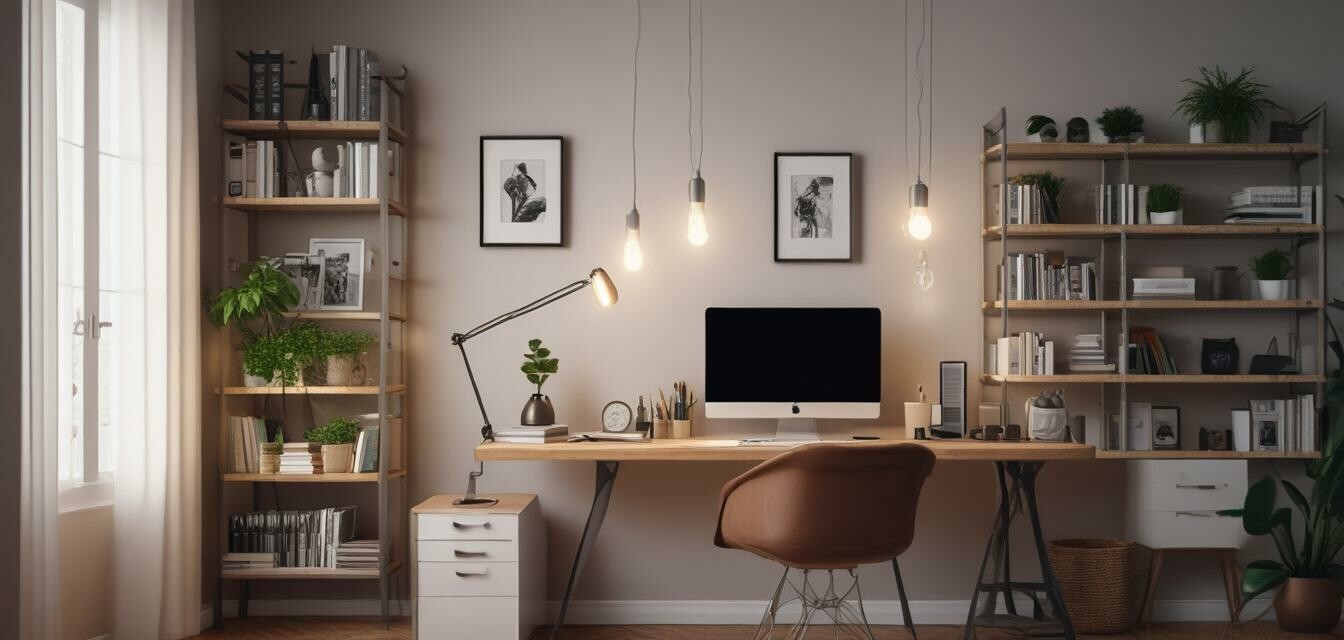
DIY Solutions for Enhancing Home Office Lighting
Key Takeaways
- Good lighting is essential for productivity in a home office.
- DIY lighting solutions can tailor the ambiance to your needs.
- Consider combining natural and artificial lighting for optimal results.
- Use budget-friendly materials to enhance your workspace.
- Incorporate adjustable light fixtures for versatility.
Finding the right lighting for your home office can be a game-changer in enhancing both aesthetics and functionality. In this guide, we will explore various DIY solutions to improve your workspace lighting. Whether you're looking to create a cozy environment or need bright light to focus, these tips will help transform your home office into an ideal place to work.
Importance of Lighting in a Home Office
Lighting isn't just about visibility; it affects your mood, focus, and productivity. Poor lighting can lead to eye strain and headaches, impacting your performance. On the other hand, a well-lit workspace can boost your creativity and efficiency.
Types of Lighting
It's essential to understand the types of lighting you can incorporate into your home office:
- Ambient Lighting: Provides overall illumination.
- Task Lighting: Direct light for specific tasks, such as reading or writing.
- Accent Lighting: Highlights specific features or decor.
DIY Lighting Solutions
Here are several creative DIY solutions that can dramatically change the lighting in your home office:
1. Desk Lamp Upgrade
Instead of buying expensive desk lamps, consider upgrading your existing one. Here's how:
- Replace the bulb with an LED version for better efficiency.
- Add a dimmer switch to adjust brightness.
- Consider adding a colored shade to create a warm glow.
2. LED Strip Lights
LED strips are a versatile lighting solution that can be easily installed. Try these ideas:
- Place them under your desk or shelves for indirect lighting.
- Install them above your monitor to reduce glare.
- Customizable colors can set your preferred ambiance.
3. Wall Sconces
Wall sconces can add style and functionality. Here's how to create your own:
- Use reclaimed wood to build stylish sconces.
- Add socket fittings for your choice of bulbs.
- Mount them at eye level for optimal light distribution.
4. Natural Lighting Solutions
Utilize natural light effectively with these DIY tips:
- Use sheer curtains to diffuse sunlight.
- Position mirrors strategically to reflect light.
- Consider plant placement where they can absorb light.
Budget-Friendly Ideas
Transforming your office doesn’t have to break the bank. Here are some budget-friendly DIY options:
| DIY Solution | Estimated Cost | Materials Needed |
|---|---|---|
| Desk Lamp Upgrade | $10-$30 | LED Bulbs, Dimmer Switch, Lamp Shade |
| LED Strip Lights | $20-$50 | LED Strips, Adhesive Tape |
| Wall Sconce | $15-$40 | Wood, Light Socket, Wire |
| Natural Light Enhancements | $5-$15 | Sheer Curtains, Mirrors |
Safety Tips for DIY Lighting
While undertaking DIY projects, always prioritize safety. Here are a few tips to keep in mind:
- Ensure your workspace is properly grounded.
- Use LED bulbs to minimize heat production.
- Have fire-resistant materials as part of your projects.
Conclusion
Enhancing the lighting in your home office is not only possible, but it can also be enjoyable with these DIY solutions. Tailoring your lighting to fit your functions and needs will make a significant difference in your productivity and comfort. For more ideas on enhancing your workspace, visit our category on DIY Tips and Tricks.
Pros
- Customizable lighting solutions.
- Budget-friendly project options.
- Enhances workspace aesthetics.
- Can significantly boost productivity.
Cons
- Requires time and effort to complete DIY projects.
- May need basic electrical knowledge for some tasks.